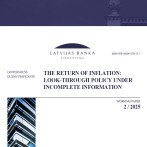Comment on inflation in September 2009
The combination of worsening of the population purchasing power, optimization of enterprise expenditure, which allows for the reduction in selling prices to maintain turnover, as well as the drop in prices in other countries from which we import some of the goods, acts to encourage dropping inflation in Latvia. Prices were on average only 0.5% higher than a year ago.
The rate at which prices decreased in September was slower than in August, but that does not indicate a lessening of the influence of reduced demand, rather reflecting the seasonal impact on prices. Just as in previous years, when the seasons change, the new collections of clothing and footwear appear for sale with prices that are relatively higher. In addition, keeping with the annual September trend, education expenses grew. Nevertheless, as a result of dropping incomes and growing unemployment, there was a steep drop in demand and the change of seasons had a lesser effect on price rises than in previous years. As a result of dropping global oil prices, there was a small drop in fuel prices as well. On the other hand, fees for financial services continued to grow.
Decreasing incomes in October will continue to determine the reduction in price levels and a drop in prices against a year ago can be predicted. It is expected that as a result of weak economic activity, prices will continue to drop in the near future as well. Under the current circumstances, the drop in prices is a positive development as, with incomes reduced, it lessens the drop in the real purchasing power of consumers. The reduced expenditure for enterprises acts to improve their competitiveness in foreign markets.
We expect the average annual inflation for 2009 to remain in the 3.0-3.5% range. The average inflation in 2010 is likely to be negative as a result of continued low demand. Yet how far the prices will drop will be determined by the possible changes in indirect taxation and, of course, by the possibilities for resumed growth both in Latvia and elsewhere. Deflation in Latvia, which is a small and very open economy is expected not to last long, because as growth in the rest of the world resumes and global trading increases, a moderate rate in consumer price increases, which would favor economic growth, is likely as a result of both domestic economic activity and rising prices for imports.
Textual error
«… …»






